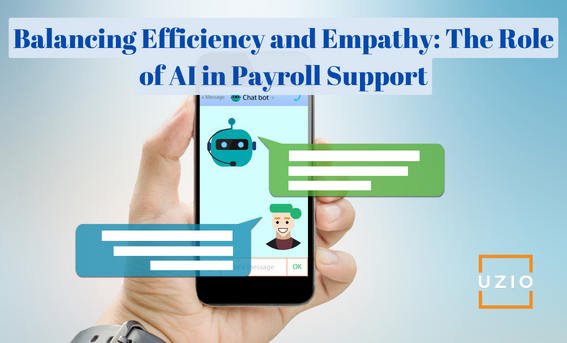
AI in Payroll Customer Support: Why Human Touch Points are Still Crucial
Quick links
-
Introduction
-
The Importance of Human Touch Points in Payroll Customer Support
-
Potential Issues with AI-Powered Payroll Customer Support
-
Examples of AI-Powered Payroll Support Gone Wrong
-
Conclusion
Introduction
You found out there were critical errors in your payroll and it’s about to run. You pick up the phone but instead of reaching a person, you get stuck in the auto attendant endless loop. Sound familiar? The use of artificial intelligence (AI) is getting incorporated in many business functions. AI use in customer support has been growing and more and more tech enthusiasts want to try out new options and opportunities in this field. Before deploying this in your business, It’s important to consider the potential drawbacks of relying solely on AI-powered chatbots and other automated systems.
While AI can certainly provide any organization benefits in terms of efficiency and cost savings, it’s important to remember the importance of human touch points in certain situations. This is especially true in the context of payroll customer support, where complex questions and personalized experiences are often required.
According to a study conducted by Accenture, 83% of consumers prefer dealing with human beings over digital channels for their customer service needs. Similarly, a survey by PwC found that 59% of consumers feel companies have lost touch with the human element of customer experience. These highlight the importance of human touchpoints in customer service, and the same can be said for payroll and employee care.
Hence one of the main issues with relying solely on AI-powered solutions for payroll and employee care is the lack of human touchpoints. These touchpoints are essential for building trust and establishing a strong relationship with your employees. Without them, the employees may feel undervalued or unimportant, leading to a drop in job satisfaction and ultimately employee retention. For instance, a study by Gallup found that businesses with engaged employees have 41% lower absenteeism, 21% higher productivity, and 10% higher customer satisfaction.
The Importance of Human Touch Points in Payroll Customer Support
Payroll is a highly personal and sensitive area for employees. In many cases, employees have questions or concerns that require a human touch. For example, they may need help navigating complex tax codes, understanding their pay stubs, or resolving discrepancies in their paychecks. In these situations, a chatbots or automated system simply cannot provide the same level of support as a human customer service representative.
Businesses working with their payroll provider also run into time sensitive issues where having the ability to interact with someone can make the difference between payroll runs happening or not.
Potential Issues with AI-Powered Payroll Customer Support
There are several potential issues to consider when it comes to relying solely on AI-powered payroll customer support.
1. Compliance Considerations for AI-Based Payroll Customer Support
One of the most critical considerations when implementing an AI-based payroll customer support system is compliance. Payroll data is sensitive and subject to a range of legal and regulatory requirements. Businesses must ensure that the AI system is compliant with all relevant laws and regulations, including data protection and privacy laws.
2. AI is Not Always Accurate
AI is only as good as the data it is trained on. If the payroll system has inaccuracies or inconsistencies, then the AI customer support system will also be flawed. This can lead to incorrect or incomplete answers to employee queries, which can cause frustration and erode trust in the payroll system. If an employee receives inaccurate payroll or other employment related information without verifying with human customer support acts upon it, it can lead to financial and legal consequences for both the employee and the employer.
3. Limited Capabilities
AI-powered chatbots are still not 100% full proof, still they haven’t been tested enough in the real world. They may not be able to handle complex or nuanced questions, or they may struggle with understanding certain accents or languages. This can lead to frustration for employees and can actually increase the workload for human customer service representatives who have to step in and assist.
4. Drop in Customer Satisfaction
In addition, relying solely on AI-powered support can lead to a drop in customer satisfaction. Employees may feel that their questions are not being answered fully or that they are not receiving the personalized attention they were accustomed to. This can lead to increased turnover or a negative perception of the company overall. From a business perspective, not being able to get timely feedback and resolution to issues can have dire consequences from missed payroll and more.
5. AI Lacks Empathy
One of the biggest advantages of human customer support is the ability to empathize with customers. When employees have questions about their pay or benefits, they often have concerns or worries that are difficult to convey through automated responses. A human representative can listen and understand the employee’s concerns, and can provide personalized solutions that take into account the employee’s unique circumstances. This personalized approach is something that AI cannot yet replicate.
Furthermore, there may be situations where an employee is experiencing emotional or personal difficulties that always require a human touch. AI customer support systems may be unable to provide the empathy and support that is needed in these situations.
6. AI Can’t Handle All Situations
Even if we are able to program AI that responds to a wide range of queries, there will always be situations that fall outside of its capabilities. For example, an employee may have a highly specific question about their benefits or pay that requires a nuanced and tailored response. Each business payroll environment is different. In these situations, AI may not have the knowledge or context to provide an accurate answer.
7. The Cost of Implementing AI-Based Payroll Customer Support
Another consideration when implementing an AI-based payroll customer support system is the cost involved. Developing and implementing such a system can be expensive, especially for SMBs. Additionally, the system may require ongoing maintenance and upgrades, which can add to the overall cost. Lastly if the system frequently fails to deliver due any factor mentioned above, there will be additional cost of course correction and request backlogs that have to be essentially served by manpower. And in case enough manpower is not available that would make the situation worse!
Examples of AI-Powered Payroll Support Gone Wrong
There have been several high-profile examples of AI-powered payroll support gone wrong in recent years.
- In one case, an AI-powered payroll system at a major retailer resulted in thousands of employees being underpaid for several months. The system was unable to handle certain nuances of the company’s pay structure, leading to significant financial hardships for affected employees.
- In another example, a large software company implemented an AI-powered chatbot for payroll support. While the system was able to handle simple inquiries, it struggled with more complex questions and often provided incorrect information. This led to a significant increase in call volume to the company’s human customer service representatives, ultimately leading to longer wait times and decreased customer satisfaction.
- In one case, an AI-powered customer support system provided incorrect information to employees about a change in payroll schedule. This caused a number of employees to miss paychecks, leading to significant financial hardship for them and damaging the company’s reputation.
Recommended Reading: Biggest pain point with Payroll and HR software
Conclusion
While AI-powered customer support systems certainly have their place, it’s important to remember the importance of human touch points in certain situations. In the context of payroll customer support, where complex questions and personalized experiences are often required, a chatbot or automated system simply cannot provide the same level of support as a human customer service representative.
So, if AI is not a complete solution, what is the right balance between AI and human touch points in payroll customer support? The answer will depend on several factors, including the complexity of the issues, the volume of inquiries, and the preferences of your customers. For example, if your organization receives a high volume of routine inquiries, such as requests for pay stubs or updates on time off balances, an AI-powered chatbot may be the most efficient option. On the other hand, if your employees frequently encounter more complex issues, such as tax withholding or benefits enrollment, a human customer service representative may be necessary to provide the guidance and expertise that AI cannot match.
By recognizing the limitations of AI-powered systems and providing a mix of human and automated support, companies can ensure that their employees receive the best possible customer service experience.
Get in touch with us for an expert-led demo to know more about UZIO payroll services.





